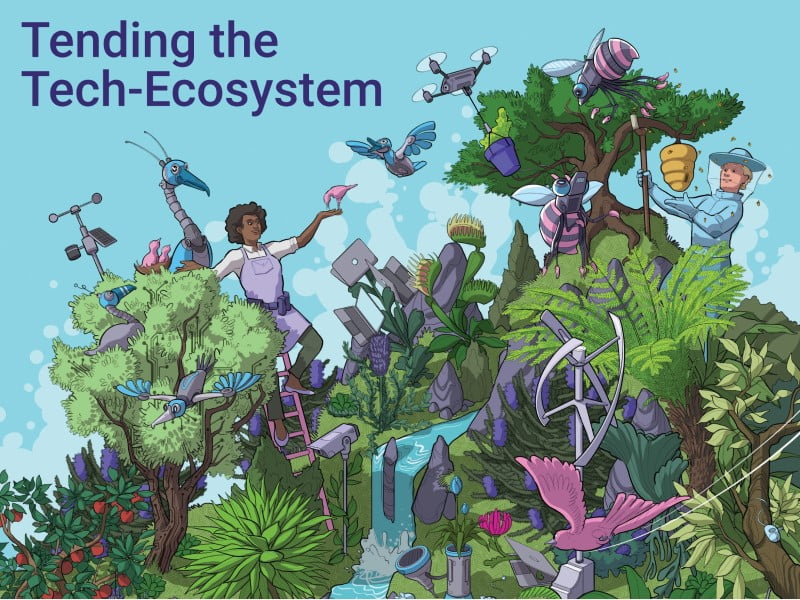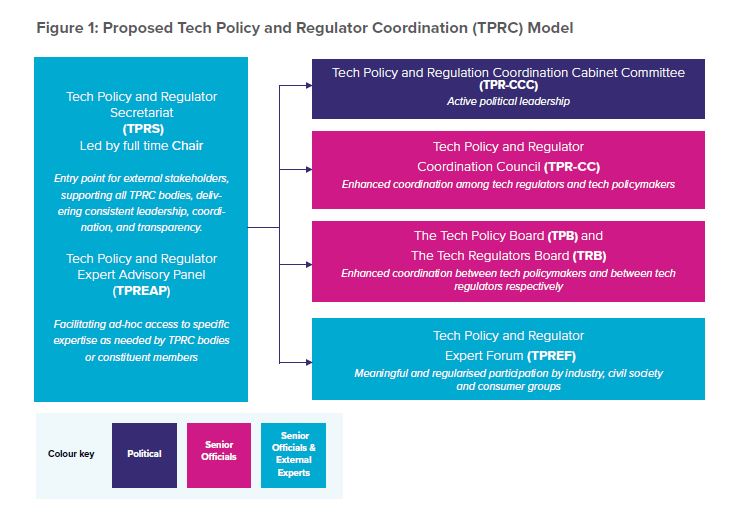Australia’s technology regulation model is in need of reform to facilitate better coordination between policy makers and the many various regulatory bodies, a new report published out of the Australian National University has found.
The university’s Tech Policy and Design Centre published its Tending the ‘Tech-Ecosystem: who should be the tech-regulator(s)?’ report on Thursday. It presents a Tech Policy and Regulation Coordination Model which includes the establishment of a specialist Cabinet committee and an expert advisory panel.
As the model stands, it comprises seven bodies. The authors of the report will begin testing the model with Australian stakeholders and groups abroad over the next two months. Parties interested in participating in the consultations are encouraged to contact the Tech Policy Design Centre.
The model was developed following interviews with 32 heads and senior representatives of Australian regulators, the Australian government, industry, and civil society as well as a comparative study with tech regulators in 14 jurisdictions.
Among those interviews, the researchers found no support for a new centralised “super tech regulator”, nor did any of the jurisdictions in the study feature a super tech regulator.

The report also noted that formal mechanisms for cooperation between tech regulators and policy makers existed only in China, Japan, and the Republic of Korea. Further, with exception of China, such mechanisms remain limited. With regards to cybersecurity, only half of the jurisdictions in the study had established a regulatory body, which includes Australia.
A shared sentiment among those interviewed was the need for greater upskilling and coordination among existing regulators. There was also a consensus on cultivating multidisciplinary skills within tech regulators, and using an outcomes-focused regulatory toolkit to distinguish between non-feasible demands from government and things industry didn’t want to do.

Tech Policy Design Centre director and lead author on the report Johanna Weaver said the model responds to the regulatory needs of Australia.
“The model proposed in the report responds to calls for political leadership, strengthened coordination, increased transparency, access to independent technical expertise, and regularised, meaningful input by industry and civil society,” Ms Weaver said.
“I commend the report to any incoming government serious about positioning Australia to get the most out of technology, while proactively addressing harms associated with our increased dependence on it.”
“I would hope that this model is ready for implementation by the incoming government. The idea is that it is ready. We will consult quickly and have something ready for whoever the new government is.
“What I hope this election provides is an opportunity to reset the relationship between government and industry, and to provide an ability to have a more nuanced conversation about the technology ecosystem that we all want to be building.”
During the launch event, Ms Weaver moderated a panel featuring Former chair of the Australian Competition and Consumer Commission (ACCC) Rod Sims, Microsoft director of corporate affairs Belinda Dennett, associate fellow at the Saïd Business School at the University of Oxford Professor Nicholas Davis, and chief executive of the Tech Council of Australia Kate Pounder.
During the discussion, Ms Pounder sought to highlight that there isn’t such a thing as a tech regulator, but rather all regulators across the economy need to think about how to deal with the regulatory questions thrown up by tech. This includes foreign investment regulators, quality regulators, and vocational and higher education systems.
Mr Sims said that from his past experience at the ACCC, his focus has been on handling the activity of big tech companies who have “enormous market power”. Expanding on a point raised during the panel discussion, Mr Sims told InnovationAus.com that we should be careful about thinking of tech as different to other sectors, from a regulatory perspective.
“I was simply making the point that if you think tech is so different to other sectors, if you think tech poses new challenges for regulators, then you’re inviting something specific to tech that might not be there for the financial sector or the manufacturing sector or the agricultural sector,” Mr Sims said.
“I just think you need to be careful, you might be inviting even more specific regulation of tech because you’re out there saying, we’re different, we’re not understood, we’re really important.”
In response to this, Ms Weaver said the tech sector was unique but no more so than any other sectors.
“Every sector is unique – the construction sector is unique compared to the financial sector, for example. So, yes, I do believe the tech sector is unique. But I don’t believe it’s any more unique than other sectors,” Ms Weaver told InnovationAus.com.
“The difference is that, over decades, regulators in other sectors have built up understandings of how the sector operates. For the tech sector, we are just at the beginning of that journey. Hence, the key finding of the report; that we need to mature the entire tech-ecosystem to build that depth of understanding.”
Mr Sims also added that although the Australian economy is relatively small it is well connected in the international network, particularly on anti-trust issues.
ANU vice-chancellor Professor Brian Schmidt said Australia faced lacklustre tech regulatory outcomes, a pattern being repeated around the world. He called on regulators to reform in the hopes of “we will get better technology for humanity”.
Earlier this year, four Australian regulators began coordinating their work on digital platforms through the launch of the Digital Platform Regulators Forum. This facilitates information sharing and collaboration on issues of search engines, digital content aggregators, social media services, private messaging services, media referral services, and electronic marketplaces.
The forum is based on a similar body in the United Kingdom called the Digital Regulation Cooperation Forum.
Do you know more? Contact James Riley via Email.

